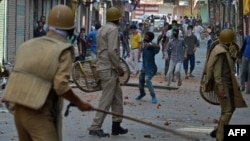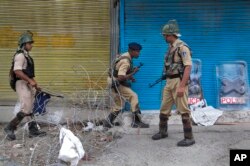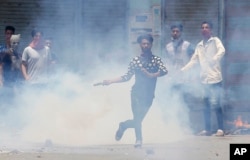Thousands of angry young people defied a curfew and took to the streets for a third day in Indian Kashmir to protest the killing of a local separatist leader.
The death toll in the unrest has climbed to more than 25. Hospitals have been overwhelmed by the hundreds injured in clashes with security forces who opened fire and lobbed tear gas shells to control the crowds.
The wounded include many policemen on whom protesters have hurled rocks and stones.
Although the crowds were much smaller compared to the weekend, and most parts of the summer capital Srinagar wore a deserted look Monday, tensions are still running high.
It is the most serious civilian unrest in the Himalayan region since 2010, when widespread street protests killed scores of people.
The tensions have been triggered by the killing of 22-year-old Burhan Wani in a shootout with security forces. The young leader of the region’s largest militant group, Hizbul Mujahideen, has become an icon for many local youth, and there are fears he could become a rallying cry and attract more youngsters in the restive region toward militancy.
Fragile peace
The latest violence again revealed the relative peace witnessed in the Kashmir Valley for more than a decade remains fragile.
Former Major General Dipankar Banerjee who heads the Institute of Peace and Conflict Studies in New Delhi, said there is strong disaffection with the state of affairs in Kashmir.
“It is with the political system, the ruling government, lack of employment, and some sort of a background element of 'azadi', freedom or whatever, that continues to be a strong sentiment in the Valley," he said. "And let us not underestimate the potential of that sentiment leading to such situations.”
As security forces struggled to restore calm, the government urged separatist leaders and mainstream political parties to help return peace in the valley.
But at least four prominent separatist leaders rejected the call, saying the government had to "abandon the policy of stopping people's marches by bullets."
Political solutions needed
Political analysts blame the local and the federal governments for not exploring political solutions to address the anti-India sentiment in the Valley.
Manoj Joshi at New Delhi’s Observer Research Foundation says the space that was created by bringing militancy under check for over a decade has been wasted.
“The armed forces and the police can bring back normalcy up to a point, but they can't restore the political normalcy. That has to be done by the politicians and they don’t seem to be doing it.”
Meanwhile, the unrest in Indian Kashmir triggered an exchange of words between arch-rivals India and Pakistan, who both lay claim to the Himalayan region and whose peace efforts to solve their dispute have not made much headway.
After Pakistani Prime Minister Nawaz Sharif spoke of “excessive force used on civilians,” in Kashmir and called for India to respect its human rights obligations, Indian Junior Home Minister Kiran Rijiju said Islamabad should worry about such violations in Pakistani Kashmir.
Pakistan on Monday summoned the Indian envoy in Islamabad to the foreign ministry to convey its "serious concerns" over what it alleged were "extra-judicial killings" of leaders and civilians by India's security forces in Kashmir.
Foreign Secretary Aizaz Ahmad Chaudhry "deplored" the firing by Indian forces on "peaceful protesters" and "highlighted that such brutal use of force is not acceptable under any circumstance," an official statement quoted him as telling the Indian diplomat.
He reiterated Pakistan's call for New Delhi to resolve the Kashmir dispute by organizing a United Nations-sponsored plebiscite in Kashmir in the divide region to let its people decide if they want to be with India or align with Pakistan, said the statement.
Indian ministry of external affairs rebuffed Pakistan's demand for a plebiscite in the Himalayan region.
"We have seen statements from Pakistan on the situation in the Indian state of Jammu and Kashmir. They reflect Pakistan's continued attachment to terrorism and its usage as an instrument of State policy," it said.
India accuses Pakistan, which controls one-third of Kashmir, of being behind the Muslim separatist insurgency in the two-thirds of the Himalayan region under New Delhi's control.
Islamabad denies the charges, saying it only provides "political, moral and diplomatic support" to Kashmiris' struggle for "self-determination."
The territorial dispute has sparked two wars between the two countries and remains the primary source of tensions in bilateral ties.
A wide-ranging bilateral dialogue aimed at normalizing ties and seeking solutions to disputes, including Kashmir, remains suspended and relations between India and Pakistan have lately deteriorated over mutual allegations of sponsoring terrorist activities on each other's soil.
VOA's Ayaz Gul contributed to this report from Islamabad.






